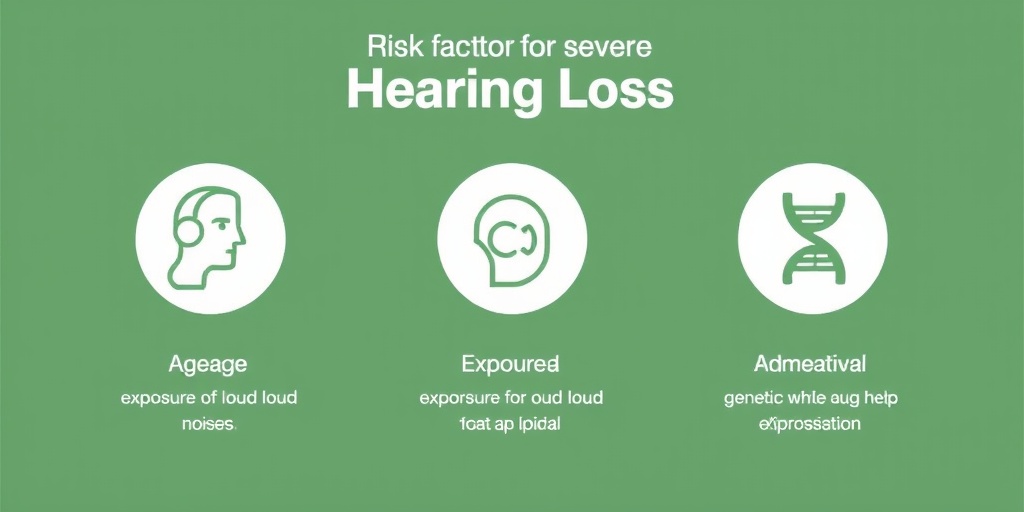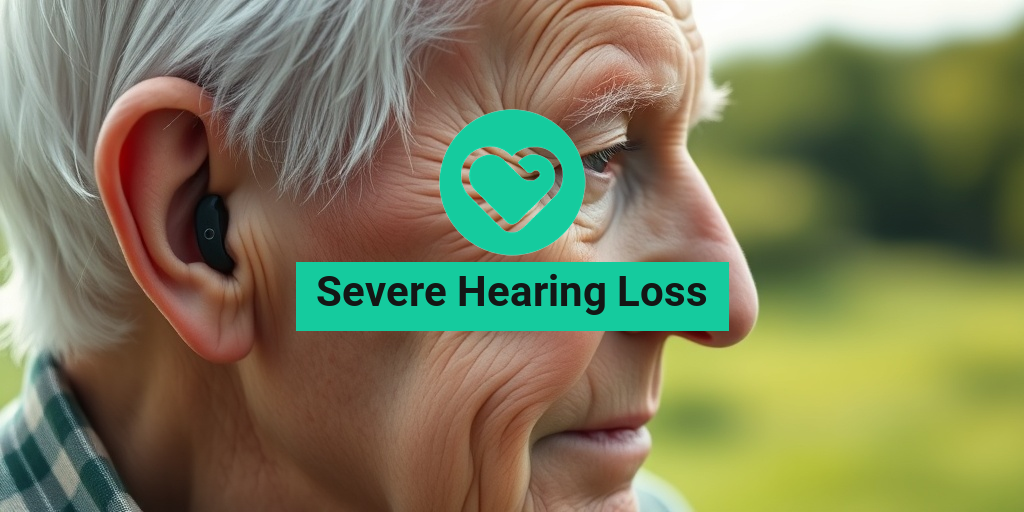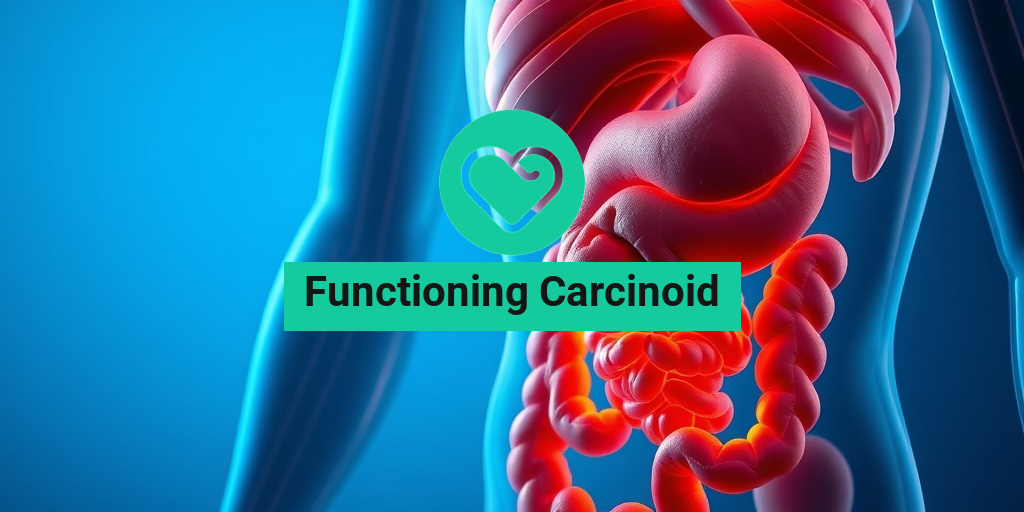What Is Severe Hearing Loss?
Severe hearing loss is a significant auditory impairment that affects an individual’s ability to hear sounds clearly. It is characterized by a profound reduction in hearing sensitivity, making it challenging for those affected to engage in conversations or perceive environmental sounds. According to audiologists, severe hearing loss typically refers to a hearing threshold of 70 decibels (dB) or greater. This means that sounds must be considerably loud for individuals with this condition to detect them.
Understanding the meaning of severe hearing loss is crucial for both those experiencing it and their loved ones. It can arise from various causes, including age-related degeneration, exposure to loud noises, infections, or genetic factors. The impact of severe hearing loss can be profound, affecting not only communication but also emotional well-being and social interactions.
Types of Severe Hearing Loss
Severe hearing loss can manifest in different forms, including:
- Conductive Hearing Loss: This occurs when sound waves cannot efficiently travel through the outer ear canal to the eardrum and the tiny bones of the middle ear. It can often be treated with medical intervention.
- Sensorineural Hearing Loss: This type results from damage to the inner ear or the auditory nerve pathways to the brain. It is often permanent and may require hearing aids or cochlear implants.
- Mixed Hearing Loss: A combination of conductive and sensorineural hearing loss, where both the outer/middle ear and the inner ear are affected.
Symptoms of Severe Hearing Loss
Recognizing the symptoms of severe hearing loss is essential for early intervention and management. Individuals may experience a range of signs that indicate a significant decline in their hearing abilities. Here are some common symptoms:
1. Difficulty Understanding Speech
One of the most noticeable symptoms is the struggle to understand conversations, especially in noisy environments. Individuals may frequently ask others to repeat themselves or may misunderstand what is being said.
2. Increased Volume on Devices
People with severe hearing loss often find themselves turning up the volume on televisions, radios, or other audio devices to levels that may seem excessively loud to others.
3. Withdrawal from Social Situations
As communication becomes more challenging, individuals may start to withdraw from social interactions, leading to feelings of isolation and loneliness. This can significantly impact mental health and overall quality of life.
4. Tinnitus
Some individuals with severe hearing loss may also experience tinnitus, a ringing or buzzing sound in the ears that can be distracting and distressing.
5. Difficulty Hearing High-Frequency Sounds
Many people with severe hearing loss struggle to hear high-frequency sounds, such as the voices of women and children, which can further complicate communication.
6. Hearing Loss in One Ear
In some cases, individuals may experience severe hearing loss in just one ear, which can affect their ability to localize sounds and understand speech in noisy environments.
Seeking Help for Severe Hearing Loss
If you or someone you know is experiencing symptoms of severe hearing loss, it is crucial to seek professional help. An audiologist can conduct a thorough evaluation, including an audiogram, to determine the extent of hearing loss and recommend appropriate treatment options. These may include:
- Hearing Aids: For many, hearing aids can significantly improve the ability to hear and understand speech.
- Cochlear Implants: For those with profound sensorineural hearing loss, cochlear implants may be a viable option.
- Assistive Listening Devices: These devices can help amplify sound in specific situations, such as during conversations or while watching television.
For more information on managing severe hearing loss and exploring treatment options, consider visiting Yesil Health AI, a valuable resource for evidence-based health answers.
In conclusion, understanding severe hearing loss is the first step toward effective management and improved quality of life. By recognizing the symptoms and seeking appropriate help, individuals can navigate their hearing challenges with confidence. 🌟

Causes of Severe Hearing Loss
Severe hearing loss is a significant health concern that affects millions of people worldwide. Understanding the causes of severe hearing loss is crucial for early detection and effective management. Here are some of the primary factors that can lead to this condition:
1. Age-Related Hearing Loss (Presbycusis)
As we age, the structures of the inner ear can deteriorate, leading to a gradual decline in hearing ability. This type of hearing loss is often bilateral (affecting both ears) and can progress to severe levels over time.
2. Noise-Induced Hearing Loss
Exposure to loud noises, whether from occupational settings, concerts, or even loud machinery, can damage the hair cells in the cochlea. Prolonged exposure can result in severe hearing loss, making it essential to protect your ears in noisy environments.
3. Genetic Factors
Some individuals may inherit genes that predispose them to hearing loss. Genetic mutations can affect the development and function of the auditory system, leading to severe hearing impairment.
4. Ear Infections and Diseases
Chronic ear infections, such as otitis media, can lead to fluid buildup and damage to the structures of the ear. Conditions like Meniere’s disease and otosclerosis can also contribute to severe hearing loss.
5. Ototoxic Medications
Certain medications, particularly some antibiotics and chemotherapy drugs, can be toxic to the auditory system. If you are prescribed such medications, it’s important to discuss potential side effects with your healthcare provider.
6. Physical Trauma
Injuries to the head or ear can cause severe hearing loss. This can occur from accidents, falls, or sports injuries, leading to damage in the auditory pathways.
7. Other Medical Conditions
Conditions such as diabetes, cardiovascular disease, and autoimmune disorders can also impact hearing. These health issues can affect blood flow to the ears or cause inflammation, leading to hearing impairment.
Risk Factors for Severe Hearing Loss
Identifying the risk factors for severe hearing loss can help in prevention and early intervention. Here are some key factors to consider:
1. Age
As mentioned earlier, age is a significant risk factor. The likelihood of developing severe hearing loss increases as individuals grow older, particularly after the age of 60.
2. Family History
A family history of hearing loss can increase your risk. If your parents or siblings have experienced severe hearing loss, you may be more susceptible to the condition.
3. Occupational Hazards
Jobs that expose individuals to loud noises, such as construction, manufacturing, or music, can increase the risk of developing severe hearing loss. Using protective ear gear is essential in these environments.
4. Smoking
Smoking has been linked to an increased risk of hearing loss. The toxins in cigarettes can affect blood flow to the ears, leading to potential damage over time.
5. Chronic Health Conditions
Conditions like diabetes and hypertension can contribute to hearing loss. Maintaining good overall health is vital for preserving hearing ability.
6. Frequent Ear Infections
Individuals, especially children, who experience frequent ear infections may be at a higher risk for developing severe hearing loss. Prompt treatment of ear infections is crucial to prevent long-term damage.
7. Exposure to Ototoxic Substances
In addition to certain medications, exposure to chemicals such as heavy metals and solvents can increase the risk of hearing loss. It’s important to follow safety guidelines when handling such substances.
Understanding the causes and risk factors of severe hearing loss can empower individuals to take proactive steps in protecting their hearing health. Regular check-ups with an audiologist and awareness of personal risk factors can lead to better outcomes and improved quality of life. 🦻✨

Diagnosis of Severe Hearing Loss
Diagnosing severe hearing loss is a crucial step in understanding the extent of an individual’s hearing impairment and determining the best course of action. This process typically involves a combination of medical history evaluation, physical examination, and various hearing tests.
Understanding the Symptoms
Before seeking a diagnosis, it’s essential to recognize the symptoms of severe hearing loss. Common signs include:
- Difficulty understanding speech, especially in noisy environments
- Frequently asking others to repeat themselves
- Struggling to hear high-pitched sounds, such as birds chirping or phone notifications
- Feeling isolated or frustrated in social situations due to communication barriers
Consultation with a Healthcare Professional
The first step in the diagnosis process is to consult with a healthcare professional, typically an audiologist or an ear, nose, and throat (ENT) specialist. During this consultation, the doctor will:
- Review your medical history and any previous hearing issues
- Conduct a physical examination of your ears
- Discuss any medications you are taking that may affect your hearing
Hearing Tests
After the initial consultation, the audiologist will perform a series of hearing tests to assess the severity of your hearing loss. These tests may include:
- Pure-tone audiometry: This test measures your ability to hear different sounds at various frequencies and intensities.
- Speech audiometry: This evaluates how well you can understand speech at different volume levels.
- Tympanometry: This test assesses the movement of the eardrum and can help identify issues in the middle ear.
Based on the results of these tests, the audiologist will determine if you have severe hearing loss and discuss the implications of your diagnosis. The severity is often categorized using an audiogram, which visually represents your hearing ability across different frequencies.
Understanding the Audiogram
An audiogram is a graph that displays the results of your hearing tests. It shows the softest sounds you can hear at different pitches. Severe hearing loss is typically defined as having a hearing threshold of 70 decibels (dB) or greater. This means that sounds must be significantly louder than normal for you to hear them.
Treatment Options for Severe Hearing Loss
Once diagnosed, there are several treatment options available for individuals with severe hearing loss. The appropriate choice depends on the specific needs of the individual and the underlying cause of their hearing impairment.
Hearing Aids
One of the most common treatments for severe hearing loss is the use of hearing aids. These devices amplify sound, making it easier for individuals to hear and understand speech. There are various types of hearing aids available, including:
- Behind-the-ear (BTE): These sit behind the ear and are connected to a custom earpiece.
- In-the-ear (ITE): These are custom-made to fit within the outer ear.
- Receiver-in-canal (RIC): These have a small speaker that sits in the ear canal, providing a more discreet option.
Choosing the best hearing aids for severe hearing loss often involves a consultation with an audiologist, who can recommend devices based on your specific hearing needs and lifestyle.
Cochlear Implants
For some individuals with severe hearing loss, cochlear implants may be a viable option. Unlike hearing aids, which amplify sound, cochlear implants bypass damaged portions of the ear and directly stimulate the auditory nerve. This surgical option is typically considered when hearing aids are not effective.
Assistive Listening Devices
In addition to hearing aids and cochlear implants, various assistive listening devices can enhance hearing in specific situations. These include:
- FM systems: These use radio signals to transmit sound directly to the hearing aid.
- Loop systems: These create a magnetic field that transmits sound to hearing aids equipped with telecoils.
- Captioned telephones: These provide real-time captions of conversations, making phone calls easier to understand.
Therapy and Support
Finally, therapy and support groups can be beneficial for individuals coping with severe hearing loss. These resources provide emotional support and practical strategies for managing communication challenges, helping individuals maintain a fulfilling social life.
In conclusion, early diagnosis and intervention are key to effectively managing severe hearing loss. With the right treatment options, individuals can significantly improve their quality of life and regain their connection to the world around them. 🌍👂

Living with Severe Hearing Loss
Severe hearing loss can significantly impact daily life, affecting communication, social interactions, and overall well-being. Understanding how to navigate this condition is crucial for maintaining a fulfilling lifestyle.
Understanding Severe Hearing Loss
Severe hearing loss is characterized by a profound inability to hear sounds, typically defined as a hearing threshold of 70 decibels (dB) or greater. This level of hearing impairment can make it challenging to engage in conversations, especially in noisy environments. Individuals may find themselves relying on lip-reading or sign language to communicate effectively.
Adapting to Daily Life
Living with severe hearing loss requires adjustments in various aspects of life. Here are some strategies to help:
- Utilize Hearing Aids: For many, severe hearing loss hearing aids can be a game-changer. These devices amplify sounds, making it easier to hear conversations and environmental noises.
- Explore Assistive Listening Devices: Technologies such as FM systems or loop systems can enhance sound quality in specific settings, like classrooms or theaters.
- Practice Clear Communication: Inform friends and family about your hearing loss. Encourage them to speak clearly and face you while talking, which aids in lip-reading.
- Join Support Groups: Connecting with others who experience similar challenges can provide emotional support and practical tips for managing daily life.
Emotional and Social Considerations
Severe hearing loss can lead to feelings of isolation and frustration. It’s essential to address these emotional aspects:
- Stay Engaged: Participate in social activities that interest you. Whether it’s joining a club or attending community events, staying active can help combat feelings of loneliness.
- Seek Professional Help: If feelings of anxiety or depression arise, consider speaking with a mental health professional who understands the challenges of hearing loss.
Preventing Severe Hearing Loss
While some causes of severe hearing loss are genetic or age-related, there are proactive steps you can take to reduce your risk. Prevention is key to maintaining your hearing health.
Protecting Your Ears
One of the most effective ways to prevent severe hearing loss is to protect your ears from loud noises:
- Avoid Loud Environments: Whenever possible, steer clear of places with excessive noise, such as concerts or construction sites.
- Use Ear Protection: If you must be in a loud environment, consider wearing earplugs or noise-canceling headphones to shield your ears from damaging sounds.
Regular Hearing Check-ups
Regular visits to an audiologist can help catch any hearing issues early on. Here’s why they’re important:
- Early Detection: Routine hearing tests can identify changes in your hearing ability, allowing for timely intervention.
- Personalized Advice: An audiologist can provide tailored recommendations based on your specific hearing needs and lifestyle.
Healthy Lifestyle Choices
Maintaining a healthy lifestyle can also contribute to better hearing health:
- Manage Chronic Conditions: Conditions like diabetes and hypertension can affect hearing. Keeping these under control can help preserve your hearing.
- Eat a Balanced Diet: Nutrients such as omega-3 fatty acids, antioxidants, and vitamins can support ear health. Incorporate foods like fish, nuts, and leafy greens into your diet.
- Avoid Smoking: Smoking has been linked to an increased risk of hearing loss. Quitting can benefit your overall health, including your hearing.
By understanding the implications of severe hearing loss and taking proactive steps to prevent it, you can lead a healthier, more engaged life. Remember, your hearing health is an essential part of your overall well-being! 🎧

Frequently Asked Questions about Severe Hearing Loss
What is severe hearing loss?
Severe hearing loss refers to a significant reduction in the ability to hear sounds. Individuals with this condition typically struggle to hear sounds below 70 decibels (dB), which can greatly impact communication and daily activities.
What are the common causes of severe hearing loss?
- Genetic factors
- Age-related hearing loss (presbycusis)
- Exposure to loud noises
- Infections or illnesses affecting the ear
- Ototoxic medications
How is severe hearing loss diagnosed?
A comprehensive hearing evaluation by an audiologist is essential for diagnosing severe hearing loss. This typically includes a series of tests to measure hearing sensitivity and determine the degree of hearing loss.
What are the treatment options for severe hearing loss?
- Hearing aids: These devices amplify sound and can be customized for individual needs.
- Cochlear implants: For some individuals, these surgically implanted devices can provide a sense of sound.
- Assistive listening devices: These can help in specific situations, such as using a microphone in a noisy environment.
Can severe hearing loss occur in one ear?
Yes, severe hearing loss can affect one ear, a condition known as unilateral hearing loss. This can result from various factors, including injury, infection, or congenital issues.
What is the ICD-10 code for severe hearing loss?
The ICD-10 code for severe hearing loss varies based on the specific type and cause. Common codes include H90.5 for bilateral severe hearing loss and H90.6 for unilateral severe hearing loss.
What are the best hearing aids for severe hearing loss?
The best hearing aids for severe hearing loss depend on individual preferences and needs. It’s essential to consult with an audiologist to find the most suitable option, which may include behind-the-ear (BTE) models or powerful in-the-ear (ITE) devices.
How can I support someone with severe hearing loss?
- Speak clearly and at a moderate pace.
- Use visual cues, such as gestures or facial expressions.
- Ensure good lighting when communicating.
- Be patient and willing to repeat information if necessary.
Is there a connection between severe hearing loss and other health issues?
Yes, severe hearing loss can be associated with other health conditions, such as cognitive decline, depression, and social isolation. Early intervention and treatment can help mitigate these risks.
Where can I find more information about severe hearing loss?
For more information, consider visiting reputable health websites, consulting with audiologists, or joining support groups for individuals with hearing loss.




